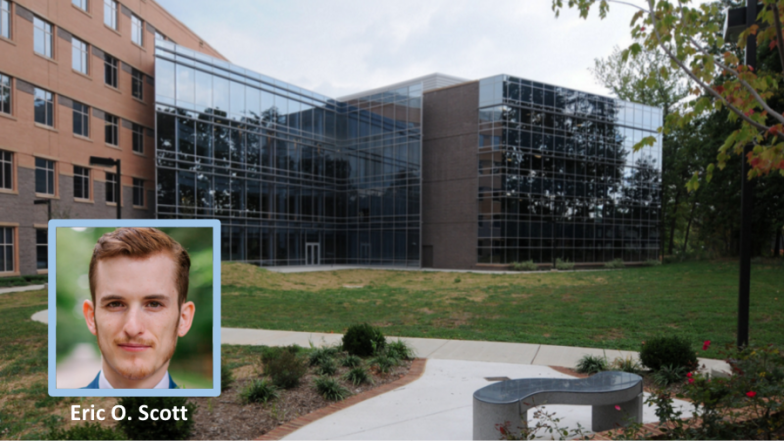Summary
PhD Student, Computer Science, George Mason University Graduate Research Assistant, George Mason UniversityInformation
Web: Personal Website CV Google Scholar
Email: escott8@gmu.edu
Address: 22030
Education
MSc in Computer Science, 2015
George Mason University
BSc in Mathematics, 2011
Andrews University
BSc in Computer Science, 2011
Andrews University
Awards and Fellowships
2015: Best Paper Award
GECCO 2015 Student Workshop
For the paper: “Evaluation-Time Bias in Asynchronous Evolutionary Algorithms.”
2011: Dean’s Fellowship
Volgenau School of Engineering, George Mason University
2010: Undergraduate Research Fellowship
Santa Fe Institute
2010 Virginia & Virgil Kinkade Excellence Award
Department of Physics, Andrews University
Publications
Refereed Journals and Selective Conferences*
*In artificial intelligence, publications in selective conferences are considered first-class contributions.
1. Landscape Features for Computationally Expensive Evaluation Functions: Revisiting the Problem of
Noise.
Eric O. Scott and Kenneth A. De Jong.
International Conference on Parallel Problem Solving from Nature, 952–961, Edinburgh, Scotland.
Acceptance rate: 42%.
2016.
2. An Evolutionary Framework for Replicating Neurophysiological Data with Spiking Neural Networks.
Emily L. Rounds, Eric O. Scott, Andrew S. Alexander, Kenneth A. De Jong, Douglas A. Nitz, and Jeffrey L.
Krichmar.
International Conference on Parallel Problem Solving from Nature, 537–547, Edinburgh, Scotland.
Acceptance rate: 42%.
2016.
3. Evaluation-Time Bias in Quasi-Generational and Steady-State Asynchronous Evolutionary Algorithms.
Eric O. Scott and Kenneth A. De Jong.
Proceedings of the Genetic and Evolutionary Computation Conference, 845–852, Denver, Colorado.
Acceptance rate: 36%.
Nominated for Best Paper in “Parallel Evolutionary Systems” track.
2016.
4. Understanding Simple Asynchronous Evolutionary Algorithms.
Eric O. Scott and Kenneth A. De Jong.
Proceedings of the Conference on Foundations of Genetic Algorithms XIII, 85–98, Aberystwyth, Wales.
Acceptance rate: 62%.
2015.
5. A Quantum Model of Exaptation: Incorporating Potentiality into Evolutionary Theory.
Liane Gabora, Eric O. Scott, and Stuart Kauffman.
Progress in Biophysics & Molecular Biology, 113 (1), 108-116.
2013.
Peer-Reviewed Workshops with Proceedings
1. Learning Genetic Representations for Classes of Real-Valued Optimization Problems.
Eric O. Scott and Jeffrey K. Bassett.
Companion Proceedings of the Genetic and Evolutionary Computation Conference, 1075–1082, Madrid, Spain.
2015.
2. Evaluation-Time Bias in Asynchronous Evolutionary Algorithms.
Eric O. Scott and Kenneth A. De Jong.
Companion Proceedings of the Genetic and Evolutionary Computation Conference, 1209–1212, Madrid, Spain.
Winner of Best Paper in Student Workshop (out of 17 papers presented).
2015.
Invited Talks
May 2016: Artificial Intelligence: Writing Programs You Don’t Understand
W.T. Woodson High School, Fairfax, VA
November 2015: Stepping-Stone Collectors: Algorithms that Use Diversity to Solve Problems
Andrews University Depts. of Math and Physics
September 2011: Machines that Learn: An Artificial Intelligence Primer
Andrews University Depts. of Math and Physics
Presentations
Formal Presentations
1. Landscape Features for Computationally Expensive Evaluation Functions: Revisiting the Problem
of Noise. 14th International Conference on Parallel Problem Solving from Nature (PPSN 2016),
Edinburgh, Scotland. September 2016.
2. Evaluation-Time Bias in Quasi-Generational and Steady-State Asynchronous Evolutionary Algorithms.
Genetic and Evolutionary Computation Conference (GECCO 2016), Denver, Colorado. July, 2016.
3. The Evolution of Evolvability in Multi-Task Evolutionary Algorithms. George Mason University PhD
CS Research Symposium, Fairfax, VA. March 2016
4. Learning Genetic Representations for Classes of Real-Valued Optimization Problems. GECCO 2015
Workshop on Evolutionary Computation for the Automated Design of Algorithms, Madrid, Spain. July
2015.
5. Evaluation-Time Bias in Asynchronous Evolutionary Algorithms. GECCO 2015 Student Workshop,
Madrid, Spain. July 2015.
6. Understanding Simple Asynchronous Evolutionary Algorithms. ACM Conference on Foundations of
Genetic Algorithms XIII, Aberystwyth, Wales. January 2015.
7. Text Mining for Quality Control of Court Records. DocEng 2014 Workshop on the Semantic Analysis
of Documents, Fort Collins, Colorado. September 2014.
8. Transfer Learning via Modularity in a Model of Technological Evolution. Andrews University Honors
Thesis Symposium, Berrien Springs, Michigan. April 2011.
9. Wordi: Fast and Scalable Word Game AI with Extensible Messaging and Presence Protocol (XMPP)
and Dynamic Programming. Andrews University Computer Science and Engineering Senior Design
Seminar, Berrien Springs, Michigan. April 2010.
10. Steady-State Analysis for Biogeography-Based Optimization. Andrews University Pi Mu Epsilon meeting,
Berrien Springs, Michigan. April, 2010.
11. Artificial Intelligence and Intelligent Design. The Second Annual Gloria Patri Conference on Religion,
Science, and the Humanities, Bobbio Pellice, Italy. June 2009.
Peer-Reviewed Poster Presentations with Proceedings
1. Multitask Evolution with Cartesian Genetic Programming.
Eric O. Scott and Kenneth A. De Jong.
Companion Proceedings of the Genetic and Evolutionary Computation Conference.
In press.
Invited
• Text Mining for Quality Control of Court Records.
Eric O. Scott, Haleh Vafaie, Zelal Gungordu, Charles E. Horowitz, and Cardford C. Brown.
DocEng Workshop on the Semantic Analysis of Documents, Fort Collins, Colorado.
Research Experience
2013–present: Machine Learning Graduate Intern
MITRE Corporation, McLean, Virginia
Member of the Judiciary Engineering and Modernization Center FFRDC
Research in data mining and speech recognition in support of the U.S. federal courts
2011–present: Graduate Research Assistant
Krasnow Institute for Advanced Study, Fairfax, Virginia
Supervisor: Kenneth De Jong
Member of the Adaptive Systems Lab
Research in evolutionary algorithms and computational neuroscience simulations
Member of the Center for Social Complexity (2 years)
Research in agent-based modeling of social systems
2010 (Summer): Undergraduate Research Fellow
Santa Fe Institute, Santa Fe, New Mexico
Internship at the bastion of complexity science, working with genetic programming
Teaching Experience
2010 (Fall): Teaching Assistant, Andrews University
Taught Artificial Intelligence to a mixture of 3rd- and 4th-year undergraduate
students, under the mentorship of Professor Stephen Thorman. I designed the
majority of the lectures and course materials. While the course focused on
bio-inspired algorithms, I included additional material on statistical learning
and data mining—covering topics such as clustering, dimensionality reduction,
Kalman filters, and learning and inference with Bayes networks.
2009 (Summer): Teaching Assistant, Andrews University
Tutoring summer physics students in daily problem-solving sessions run by the
Department of Student Success.
Related Professional Experience
GitHub account: https://github.com/SigmaX
2006–2011: C# Programmer (Part time)
College of Arts and Sciences Dean’s Office, Andrews University
2008 (Fall): Visual Basic Sub-Contractor
PC Consultants, Buchanan, MI
2008 (Summer): PHP Programming Intern
Ardent.com, Fort Wayne, IN

